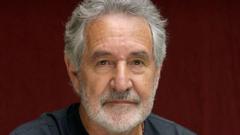In a statement released by his family, he was remembered as "an immense artist" and a passionate fighter for a better world. Known for his sharp intellect and creativity, Breytenbach played a significant role in opposing apartheid. The British television show Spitting Image once referred to him as "the only nice South African” in an ironic song, highlighting his unique position during a tumultuous time.
Born on September 16, 1939, in Western Cape, Breytenbach was an important member of the Sestigers, a group of Afrikaans writers who sought to challenge the racist nature of apartheid while celebrating the beauty of the Afrikaans language. He left South Africa in 1960 and spent much of his life in Europe, yet his South African identity remained a vital part of his narrative.
His commitment to fighting apartheid led to his imprisonment in 1975 for attempting to assist resistance groups. After serving seven years, including two in solitary confinement, Breytenbach was released thanks to the intervention of then-French President François Mitterrand. His time in prison heavily influenced his writing, especially his notable work, "The True Confessions of an Albino Terrorist."
After the fall of apartheid, Breytenbach directed some of his criticisms towards the African National Congress (ANC), expressing disappointment at the perceived corruption within the party. His international activism included a poignant letter to Israeli Prime Minister Ariel Sharon, advocating for the rights of Palestinians.
With over 50 published works and numerous accolades, including being named a Knight of the Order of Arts and Letters in France, Breytenbach's contributions extend to his art, often characterized by themes of captivity. He is remembered as a steadfast advocate for justice and equality who impacted lives globally. Breytenbach is survived by his wife, Yolande, and their family, leaving a profound legacy in both the literary and activist arenas.
Born on September 16, 1939, in Western Cape, Breytenbach was an important member of the Sestigers, a group of Afrikaans writers who sought to challenge the racist nature of apartheid while celebrating the beauty of the Afrikaans language. He left South Africa in 1960 and spent much of his life in Europe, yet his South African identity remained a vital part of his narrative.
His commitment to fighting apartheid led to his imprisonment in 1975 for attempting to assist resistance groups. After serving seven years, including two in solitary confinement, Breytenbach was released thanks to the intervention of then-French President François Mitterrand. His time in prison heavily influenced his writing, especially his notable work, "The True Confessions of an Albino Terrorist."
After the fall of apartheid, Breytenbach directed some of his criticisms towards the African National Congress (ANC), expressing disappointment at the perceived corruption within the party. His international activism included a poignant letter to Israeli Prime Minister Ariel Sharon, advocating for the rights of Palestinians.
With over 50 published works and numerous accolades, including being named a Knight of the Order of Arts and Letters in France, Breytenbach's contributions extend to his art, often characterized by themes of captivity. He is remembered as a steadfast advocate for justice and equality who impacted lives globally. Breytenbach is survived by his wife, Yolande, and their family, leaving a profound legacy in both the literary and activist arenas.


















